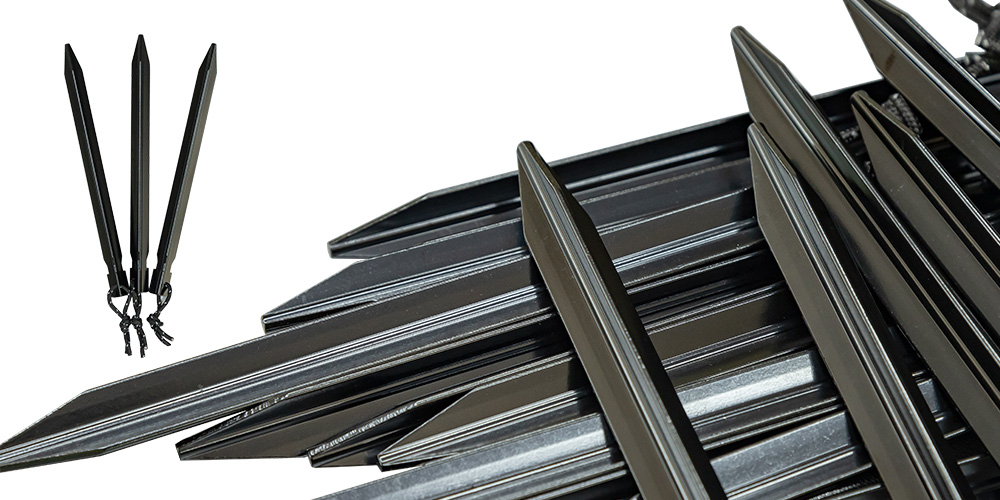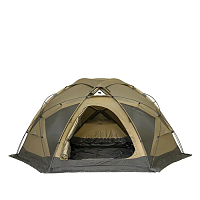Cart
How to Pick the Best Tent Pegs

Choosing the right tent pegs is essential for securing your tent and ensuring stability in various camping conditions. Here are some factors to consider when picking tent pegs:
1. Material:
- Tent pegs are available in different materials, including aluminum, steel, titanium, and plastic. Each material has its own advantages:
- Aluminum: Lightweight, durable, and corrosion-resistant. Ideal for backpacking or lightweight camping.
- Steel: Strong and sturdy, suitable for camping in challenging terrains or windy conditions.
- Titanium: Lightweight, strong, and corrosion-resistant. Expensive but excellent for backpacking and ultralight camping.
- Plastic: Lightweight and affordable. Suitable for soft ground but may not be as durable as metal options.
2. Length and Shape:
- Standard Length: Most tent pegs are around 6-8 inches long and suitable for most camping environments.
- Long Length: If you expect to encounter soft or sandy ground, longer pegs (10-12 inches) provide better anchoring.
- V-Shaped or Y-Shaped Pegs: These pegs offer enhanced holding power in loose or sandy soil.
- Shepherd's Hook or J-Shaped Pegs: Suitable for firm or rocky ground where penetrating the earth is challenging.
3. Weight and Portability:
4. Durability and Strength:
5. Specialized Pegs:
- Snow/Sand Pegs: These pegs feature a wider surface area or flukes to provide better hold in snow or sand.
- Stakes with Reflective Cord: Tent pegs with reflective cords or guy lines increase visibility at night, reducing the risk of tripping over them.
6. Quantity:
Consider the number of tent pegs you'll need for your tent's size and configuration. Larger tents or tents with multiple guy lines will require more pegs for proper anchoring and stability. It's recommended to carry a few extra pegs as backups in case of loss or damage.
Conclusion
By considering these factors, you can choose tent pegs that offer optimal stability, durability, and convenience, ensuring your tent remains securely anchored during your camping adventures. Have a nice trip!
- Contact Us
-

About Pomoly
Pomoly is a leading camping brand specializing in hot tents and tent stoves. We are camping life explorer, Follow Page / Join Group, let's make camping enjoyful together!
Working Hours
Mon-Fri, 09:00 - 17:00

- Company Info
- NEWS
- About us
- Pomoly Name
- Leave-No-Trace
- Contact Now
- Facebook Group
- YouTube Learning
- Contact Us
- Topic Collections
- Policies & Terms
- Payment Policy
- Shipping Policy
- Return & Refund
- Privacy Policy
- Terms of Use
- Tax Policy
- Website Disclaimer
- Safety Disclaimer
- Warranty Policy
- Promotion Policy
- Pre-order Policy
- INTELLECTUAL PROPERTY RIGHTS
- Dealers Agreement And Terms
- Become Affiliate
- User Center
- Forget Password
- My Orders
- Tracking Order
- My Account
- Register
- Popular Searches
-
Tipi Tents Dome Tents Camping Tent Hammock Stove Camping Camping Pellet Stove Circle 6 Titanium Water TankDome X Locomotive 20 LEO 2 camping tent T-Brick 2.0 T1 2.0 tent stove Dweller wood stove Oroqen 2.0 Chimney Water Tank Lumberjack STOVEHUT Bromance 70 Tipi Pomoly Coupon Baker Oven Stove Titanium elbow Fire Pits Tent Stove titanium Stove Outdoor Pellet Stove
keebon pellet stove






